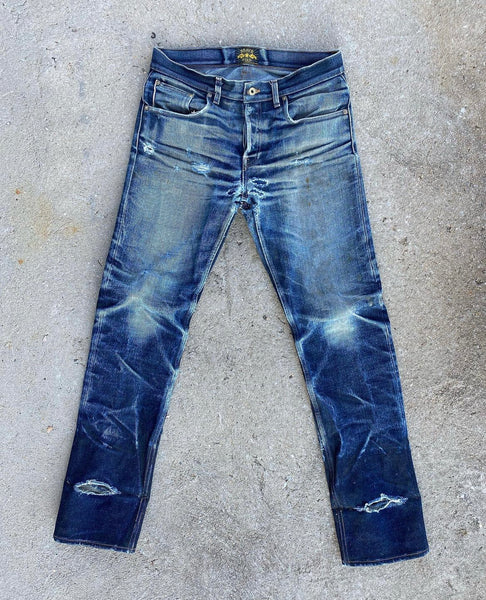Raw Selvage Denim: The Original Sustainable Denim
In recent years, the denim industry has seen a significant shift towards sustainability, with consumers becoming more conscious of the environmental impact of their clothing choices. One notable trend within this movement is the resurgence of raw selvage denim. This traditional denim-making technique is gaining popularity not only for its unique aesthetics but also for its positive environmental implications. In this article, we'll explore how raw selvage denim serves as a precursor to sustainable denim by forgoing the environmentally harmful processes of industrial washing, including potassium spray and stone wash.
Understanding Raw Selvage Denim: Raw selvage denim, often referred to as "selvedge" or "raw denim," is made from the highest quality denim fabric woven on traditional shuttle looms. The selvage edge, characterized by its tightly woven, clean-finished edge, contributes to the fabric's durability and longevity. Unlike modern denim manufacturing methods, raw selvage denim is not subjected to heavy pre-treatments or artificial distressing techniques. Instead, it is left in its natural, untreated state, allowing the wearer to shape the denim's unique fade patterns and creases over time.

The selvage edge on the side seam of a pair of raw selvage denim jeans
Environmental Impact of Industrial Washing: Traditional denim production, especially during the 1980s,1990s and 2000's relied heavily on industrial washing techniques to achieve the distressed, worn-in look that was in high demand. These processes often involved harmful chemicals, excessive water usage, and energy-intensive machinery. Two commonly used methods were potassium spray (also known as "whiskering") and stone washing. Potassium spray involved applying potassium permanganate to the denim fabric to create the faded appearance, while stone washing required tumbling denim with pumice stones to soften and distress the material.

Potassium permanganate spray booth
The Sustainability Advantage of Raw Selvage Denim: Raw selvage denim's sustainability advantage lies in its minimalist approach to production. By skipping the intensive washing and distressing processes, this denim variant significantly reduces its environmental footprint. Here's how:
-
Reduced Water Consumption: Raw selvage denim production consumes significantly less water compared to industrial washing methods, which often require large amounts of water for rinsing and finishing.
-
Chemical Reduction: The omission of chemical treatments like potassium spray eliminates the need for harmful substances, reducing pollution and promoting safer working conditions for factory workers.
-
Energy Efficiency: Raw denim production relies less on energy-intensive machinery and processes, contributing to lower carbon emissions and a smaller overall energy footprint.
-
Extended Lifespan: Raw selvage denim's durability ensures that the garment lasts longer, reducing the need for frequent replacements and lowering the overall demand for denim production.
-
Personalized Fading: The natural fading process of raw selvage denim offers wearers a unique, personalized look that evolves over time. This eliminates the desire for artificial fading techniques and encourages a connection between consumers and their clothing.
Conclusion: Raw selvage denim stands as a testament to the potential of traditional, minimalist production methods in the context of sustainability. By avoiding the environmentally damaging practices of industrial washing, such as potassium spray and stone wash, raw selvage denim exemplifies a responsible approach to denim production. As consumers continue to prioritize sustainable choices in their fashion selections, the revival of raw selvage denim offers a timeless alternative that not only looks good but also minimizes the ecological impact of denim manufacturing.
A prime example of authentically worn in raw selvage denim




Leave a comment